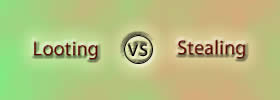Law & Ethics
|
Secular is a term defined as not related to religion. Laic is used to describe the absence of any religious involvement in governmental affairs. |
|
Secular means not concerned with or related to religion. A sectarian is a person who is narrowly confined or religiously devoted to a particular sect or group. |
|
Secular means having no religious affinities. Liberal means having social and political views favoring progress and reformation. |
|
Secular means not concerned with or related to religion. Democratic is a concept relating to the principles of democracy. |
|
Secularism is a philosophy, which forms its ethics without any reference to religion and which promotes the development of human art and science. Communalism is a principal of living together, sharing possessions and responsibilities. |
|
Secular is a concept, in which a system forms its morals without any religious influence. Communal is defined as a religious community. |
|
Ethics is a branch of philosophy, also known as moral philosophy. It helps humans deal with human morality and concepts such as good and evil, right and wrong, virtue and vice, justice and crime. The main difference between eastern and western ethics is the fact that Western Ethics is about finding truth, whereas Eastern Ethics are very much about the protocol, and showing of respect. |
|
An act is an official copy of a statute or regulation that is initially presented in the form of a bill and after being verified and passed in the process of legislature, it is then enforced in a legal manner. In context to act, rules define the guidelines that must be followed for the successful implementation of the act. |
|
Motive is the reason behind doing an action. Intention is the drive that provokes a person to commit to an action. |
|
Legislation refers to the act of making or enacting laws, whereas litigation refers to the legal proceedings in order to resolve a dispute |
|
Kidnap refers to a confinement without holding the legal authority to do so, whereas hostage refers to a person or entity which is held by a captor as a security. |
|
Stealing generally refers to the activity to take away belongings of the other without permission or legal right, whereas looting is a kind of stealing typically during a war, riot, etc. |
|
Copyright gives a person the ownership and rights over an original piece of work. A trademark is a recognizable sign, design or expression which is associated with a brand. Trademarks can also be just a word, a phrase, symbol, design or any combination herewith. |
|
Laws are actually rules and guidelines that are set up by the social institutions to govern behavior. These laws are made by government officials. Laws must be obeyed by all. Laws set out standards, procedures and principles that must be followed. Justice is a concept that is based on equality, righteousness, ethics, morality, etc. This concept states that all individuals must be treated equal and the same. The term justice is a huge part of law and almost all aspects of law are based on this concept. |
|
Laws are actually rules and guidelines that are set up by the social institutions to govern behavior. These laws are made by government officials. Laws must be obeyed by all. Laws set out standards, procedures and principles that must be followed. Equity is a branch of law that was developed as a supplement to the strict statutory laws that may provide too harsh punishments. In layman’s terms, equity is a part of law that decides punishment on the basis of justice and fairness after looking at all aspects of the punishment, including the motive of the accused. |
Pages
 |
 |
 |
 |
 |
 |
 |
 |















